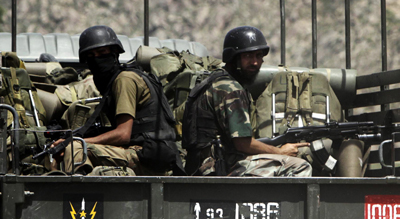Journalists in Pakistan have come under rapidly escalating pressure as the military confronts Taliban militants in the northwest region of the country. Threats and attacks from both sides have made reporting from Taliban-controlled areas more dangerous.
On Wednesday, the military harassed and fired on reporters covering its operations in the Buner Valley, about 65 miles (100 kilometers) northwest of Islamabad, according to the Pakistan Federal Union of Journalists (PFUJ). For weeks, local journalists have told CPJ, the Taliban have openly and repeatedly threatened anyone who reports critically about Taliban rule.
Until recently, most of the Taliban’s military and political advances had gone uncontested in Pakistan’s Northwest Frontier Province. The fighting is now heaviest in the region’s Lower Dir district, though local and international media have reported that the military has retaken the main city, Buner.
In the last three days, in the adjoining district of Swat, someone dropped pamphlets at TV and newspaper offices warning them not to question Taliban rulings, according to the PFUJ. Swat came under Shariah law after the government reached an agreement with a local cleric, Maulana Sufi Mohammad, in February in an attempt to end attacks on the government. The PFUJ also said letters have been sent to some media offices in the area as well as in Islamabad and other cities, accusing specific journalists of not reporting fairly about Taliban activities. Amnesty International reported that “the Taliban warned journalists they would be tried in the Taliban’s Sharia courts and called the press club in Timergara [on Tuesday], threatening to send a car full of explosives.”
“The situation for journalists is getting worse from all sides,” said Mohammad Riaz president of Khyber Union of Journalists. “The military has clamped down on journalists covering the operations in Buner. But we are taking the threats from the Taliban even more seriously.”
Shoukat Ali, the ARY One World Television correspondent in Buner, told CPJ that at least four journalists have fled the town along with thousands of others during the government’s operations against the militants. “The situation is going from bad to worse for everyone,” he said.
In Peshawar, Dilawar Jan, the correspondent for the English-language daily The News, was detained overnight by the government intelligence agencies on Tuesday. The paper said Jan was picked up and questioned about the sources for a report on the military’s operations in Dir that he wrote for The News on Monday. His detention was met with strong protests by colleagues at the Khyber Union of Journalists. The media support group Pakistan Press Freedom said Jan was blindfolded and move to two different sites, but was not physically abused while he was held.
Mazhar Abbas, ARY One World Television deputy director and former PFUJ secretary-general said the union is also concerned about the well-being of more than 12 local journalists based in Swat who want to leave the area but are afraid to leave their families behind. He also said PFUJ has confirmed reports of an Al-Jazeera TV crew being detained and released on Tuesday after their car came under military fire while they were covering the operation in Buner. Al-Jazeera’s bureau chief in Islamabad, Ahmad Muaffaq Zaidan, told PFUJ that “seven bullets hit the car. It was direct fire.”
Abbas and other Pakistani journalists said that a major broadcaster (the station has asked them not to identify it publicly) has pulled at least two of its correspondents off the air after Taliban complaints about their coverage. Abbas says the Taliban callers do not attempt to hide their identities when they make their threats and leave telephone numbers where they can be reached.
Pakistani journalists have been heavily targeted in the past, and have relatively strong professional organizations to support them, but the fighting has raised the pressure to new heights. Journalists CPJ has spoken with say they will continue their work. While conducting a telephone interview with CPJ from Karachi, Rana Mubashir of News One TV gave a typical response. “I, for one, will not accommodate my reporting to anyone’s demands, no matter what they threaten,” he said.
